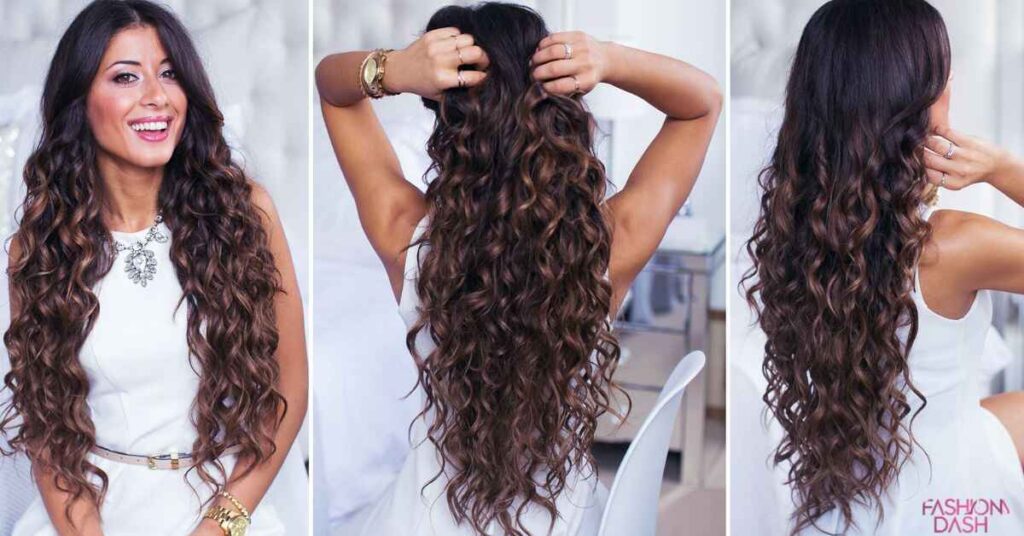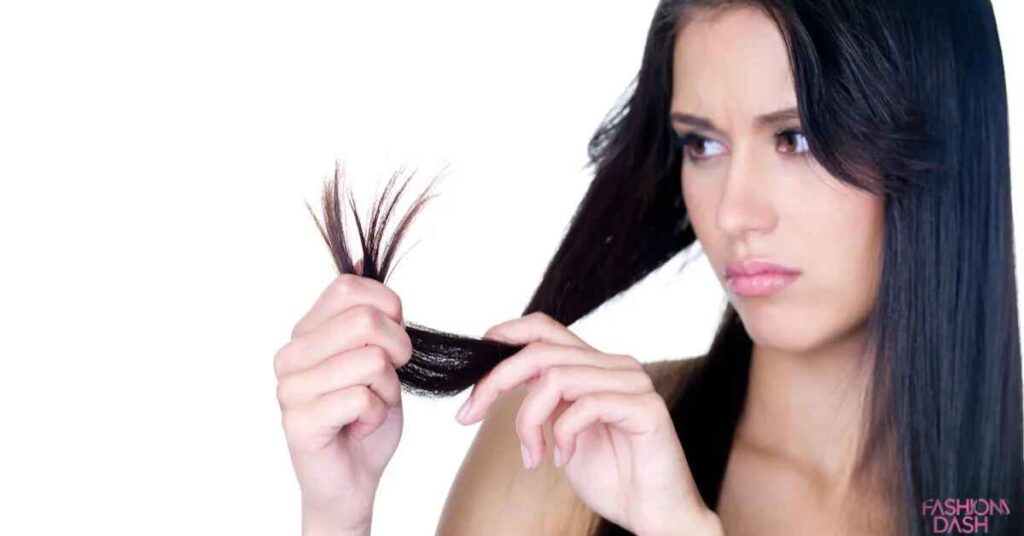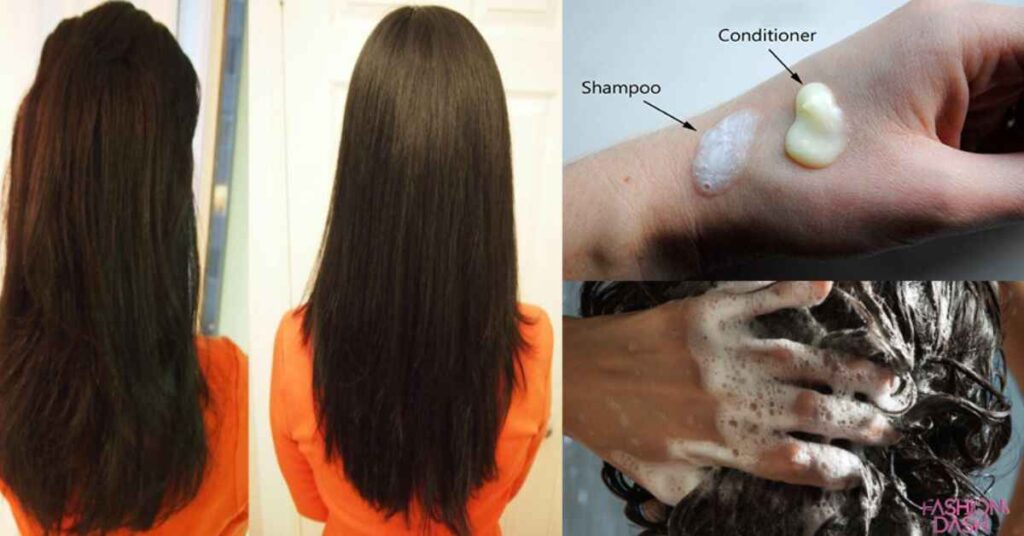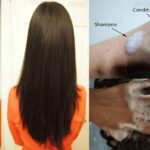Understanding the optimal duration for leaving conditioner in your hair is crucial for achieving healthy, nourished locks. With varying formulas and instructions, it’s essential to grasp the specifics to avoid over or under-conditioning.
While shampooing is straightforward, conditioner application demands more attention. Factors like hair type, product type, and desired results influence the duration.
Whether it’s a quick rinse-out conditioner or an overnight deep treatment, knowing the appropriate timing ensures maximum benefits without any adverse effects.
How to Use a Conditioner & Why Should I Use It?

Conditioners are hair’s best friend, working to nourish and protect strands for a smooth, shiny, frizz-free finish. Their primary function is to coat the hair cuticles with a moisturizing layer that penetrates the strands, replacing lost lipids and proteins. This conditioning film is left behind after rinsing to shield hair from environmental stressors.
Read This Blog: HOW LONG SHOULD BLEACH SIT ON HAIR
There are three main types of conditioners.
- Rinse-Out Conditioner: A lightweight formula applied after shampooing and rinsed out. It provides a basic conditioning layer.
- Deep Conditioning Treatment: A richer, more intensive treatment that deeply moisturizes hair. It’s left on for an extended period before rinsing.
- Leave-In Conditioner: A spray or cream that coats and conditions hair without requiring a rinse-out step.
The ideal conditioning routine depends on your hair’s needs, as timing varies for each formula to allow proper penetration and nourishment.
Do You Use a Conditioner Every Day?
While the standard recommendation is to use a rinse-out conditioner a few times per week, those with extremely dry, brittle hair may benefit from daily conditioning. However, over-conditioning can cause issues for hair that doesn’t require that much extra moisture.
If your hair does not require the extra moisture, then using a conditioner every day may cause damage in the form of build-up and irritation.
The key is assessing your hair type and only conditioning as frequently as needed to avoid protein overload or a coated, dull look and feel.
How Long Should I Leave the Rinse-Out Conditioner In Before Rinsing?
When using a basic rinse-out conditioner, follow these steps.
- Apply to damp, not soaking wet hair. Excess water will cause the product to slide right off instead of absorbing.
- Work through with a wide-tooth comb to ensure even distribution from roots to ends.
- Leave it for 1-2 minutes to allow the conditioner to penetrate and coat the cuticle.
- Rinse thoroughly until all residue is removed.
Some oil-based rinse-out masks like Wella SP Luxe Oil may require closer to 3-5 minutes, but avoid overdoing it with these daily rinse-out formulas meant for light conditioning.
How Long Should I Leave the Deep Treatment Conditioner In Before Rinsing?

Deep conditioning treatments like Kérastase Densifique require significantly more time for their reparative, intensive moisture to fully penetrate the hair shaft. While some call for 10-20 minutes, others are meant to be left overnight or for several hours.
Also Read This Blog: HOW TO FIND YOUR FASHION STYLE
As a general rule:
- Thicker, coarser, or damaged hair can handle leaving deep conditioners in for extended periods like overnight. The longer it’s left on, the better it can treat issues like dryness and breakage.
- Fine or thin hair should limit deep conditioning to the recommended short time frame (10-30 minutes typically) to avoid weighing hair down and oversaturating it.
Always check individual product instructions, but don’t be afraid to maximize that deep conditioning time for parched strands in need of an intensive moisture boost.
Examples of Popular Deep Conditioners and Their Recommended Leave-In Times:
| Deep Conditioner | Recommended Leave-In Time |
| Shea Moisture Manuka Honey & Mafura Oil | Up to 30 minutes |
| Carol’s Daughter Black Vanilla | 15-30 minutes |
| SheaMoisture Raw Shea Butter Deep Treatment Masque | Overnight or 30 minutes |
| Briogeo Don’t Despair, Repair! Deep Conditioning Mask | 5-10 minutes |
How Long Should I Leave Conditioner on Dry Hair?
While conditioners are ideally used on wet hair post-shampoo, allowing a rinse-out or deep conditioning formula to absorb into dry hair isn’t necessarily a bad thing.
It doesn’t hurt to let it sit and absorb if you are applying conditioner on dry hair. The nourishing formula will have time to penetrate the hair follicle and restore some much-needed moisture.
Just be sure to follow these tips when conditioning dry hair.
- Check product instructions, as some may not be recommended for dry hair application.
- Focus on the mid-lengths and ends rather than oversaturating the scalp area.
- Leave it for 10-30 minutes as a general rule before rinsing thoroughly.
- Comb through to distribute the conditioner evenly through strands.
Deep conditioning dry hair can be an effective way to restore luster and hydration to extremely parched, brittle strands. Just don’t make a habit of it with lighter daily conditioners.
How Long Should I Leave a Conditioner on Curly Hair?

Curly and coily hair tends to be on the drier side, as the hair’s natural oils have a harder time traveling from the scalp to the ends. This makes using a high-quality, moisturizing conditioner absolutely essential for maintaining curl health and definition.
When conditioning curly hair.
- Focus the product on the ends where it’s most needed rather than oversaturating roots.
- Deep condition regularly – at least once a week if hair is very dry or high-porosity.
- Leave rinse-out conditioners in 2-3 minutes and deep treatments up to overnight as needed, checking product instructions.
- Use a wide-tooth comb or fingers to gently work the conditioner through curls without disturbing the curl pattern.
Proper conditioning makes a world of difference in preventing frizz, dryness, and breakage for curly and coily textures. Adjust conditioning time as needed for your hair’s moisture levels.
What About Leave-In Conditioners? Can You Leave It In Dry Hair?

Unlike rinse-out formulas, leave-in conditioners are specifically designed to be left in the hair without rinsing. These lightweight creams, sprays, or oils continue providing nourishing conditioning benefits throughout the day or in between washes.
The best technique is to apply the leave-in to towel-dried hair after showering. Work it through from roots to ends, concentrating on dry or damaged areas. There’s no rinsing required – just style as usual and enjoy the extra hydration and protection!
What Happens If I Leave a Conditioner In Too Long or Overnight?
While certain deep conditioning treatments call for extended leave-in times, routinely leaving regular rinse-out conditioners in too long or overnight can spell trouble. Potential consequences include.
- Product buildup: The ongoing conditioning can cause a coated, dull look and feel over time.
- Hair cuticle swelling: Absorbing too much moisture makes cuticles swell and lift, leading to roughness, frizz, and potential breakage.
What Happens If I Leave a Conditioner In Too Long or Overnight?
While certain deep conditioning treatments call for extended leave-in times, routinely leaving regular rinse-out conditioners in too long or overnight can spell trouble. Potential consequences include.
- Product buildup: The ongoing conditioning can cause a coated, dull look and feel over time.
- Hair cuticle swelling: Absorbing too much moisture makes cuticles swell and lift, leading to roughness, frizz, and potential breakage.
- Limp, weighed-down hair: An overly coated feel weighing hair down, especially for fine or thin hair types.
- Scalp irritation: Heavy product residue can clog pores and cause irritation.
- Greasy roots: All that excess conditioning product accumulating at the scalp.
While a few extra conditioning minutes here and there won’t cause immediate damage, making overnight conditioning a habit with rinse-out formulas is counterproductive. Deep treatments specifically formulated for that purpose are best for intensive, extended conditioning.
What Happens If You Don’t Rinse Our Conditioner?

On the flip side, failing to thoroughly rinse out any conditioner can lead to a whole new set of hair woes:
- Heavy, weighed-down strands: Excessive conditioning residue coating and dragging hair down.
- Dull, lifeless look: Instead of shine, hair appears coated and lackluster.
- Greasy feel and appearance: All that lingering product can quickly make hair look and feel like an oil slick.
- Flakes or buildup: Residue mixing with oils, dirt, and product can create nasty flakes or buildup.
- Potential hair loss: In extreme cases, excessive buildup may clog follicles and impede growth.
Fine, thin hair is especially prone to these issues when conditioners aren’t rinsed out fully. But no hair type is immune to the negative effects of leaving products in long-term.
It can be tempting to try and combat dry hair quickly. If you use too much product and don’t rinse the conditioner properly, your hair will likely feel heavy and weighed down.
While a little bit of conditioner can be a good thing, too much of it lingering on strands will do more harm than good. When it comes to conditioning, rinsing thoroughly is key.
Frequently Asked Question
Can I leave the conditioner in my hair overnight?
Yes, depending on the product and your hair type, leaving the conditioner overnight can provide deep hydration. However, it’s essential to follow product recommendations to avoid over-conditioning.
How long should I leave the rinse-out conditioner in my hair?
Typically, one to two minutes is sufficient for a rinse-out conditioner to be effective. Longer durations may lead to product build-up or weigh down the hair.
Should I use a conditioner every day?
It depends on your hair type and condition. While daily conditioning is suitable for dry or damaged hair, overuse can cause build-up and irritation for some hair types.
What happens if I don’t rinse the conditioner properly?
Improper rinsing can lead to heavy, greasy hair due to product build-up, particularly with rinse-out conditioners. It may also cause irritation and discomfort on the scalp.
How long should I leave a deep treatment conditioner in my hair?
Deep treatment conditioners are typically left on for longer durations, ranging from a few minutes to overnight, depending on the product and hair type. This allows for deeper hydration and repair.
Conclusion
Understanding the optimal duration for leaving conditioner in your hair is pivotal for maintaining its health and vitality. Whether it’s a rinse-out conditioner for quick hydration or a deep treatment for intensive repair, adhering to recommended timings ensures effective results.
Over-conditioning can lead to product build-up and potential damage, while under-conditioning may result in dry, brittle hair. By considering factors such as hair type, product formulation, and desired outcomes, you can tailor your conditioning routine to suit your individual needs.
Ultimately, a balanced approach to conditioner application, along with proper rinsing techniques, contributes to achieving the luscious, nourished locks you desire. Remember to follow product instructions and listen to your hair’s unique requirements for optimal conditioning benefits.







